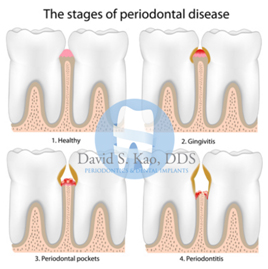
Periodontitis fast facts
- Periodontitis is when the gum disease has been left untreated as gingivitis and has become more severe.
- Periodontitis can lead to bone loss under teeth as well as teeth themselves.
- Treatments are often required by a trained periodontist.
- Symptoms of periodontitis include:
- Puss between teeth and gums
- Gums pulling away from teeth
- Permanent teeth becomes loose
Take baby steps.
A visit to your dentist is the first step. Adding certain foods to your diet also can help speed the healing process and improve the health of your gums. Continuing to eat these foods after your gums heal may help prevent future mouth problems as well.
Get all your vitamin intakes, especially vitamin C.
Vitamin C helps encourage healing and maintenance of healthy gum tissues. Your gums can become inflamed and begin to bleed if you are deficient of this vitamin. Oranges are a top source of vitamin C and adding one a day will help provide enough of this essential vitamin to heal your gums.


